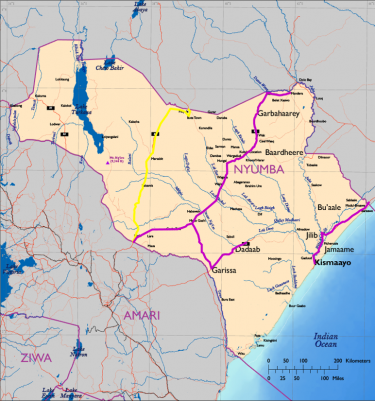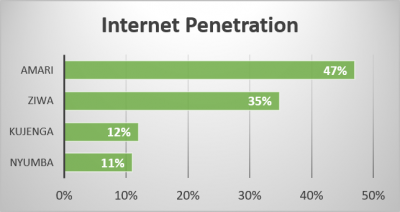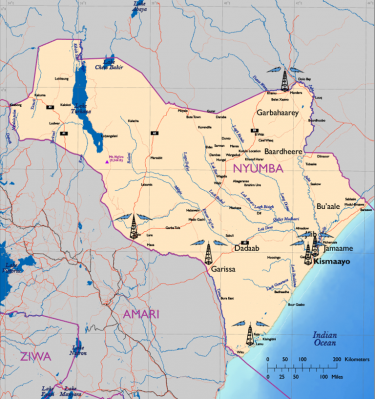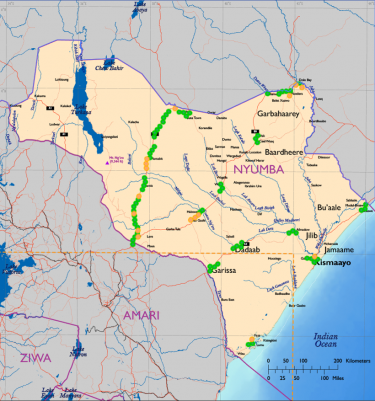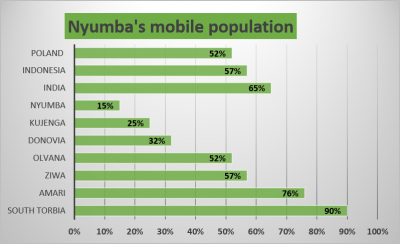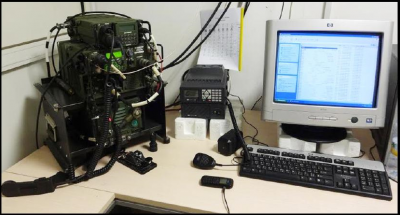Information: Nyumba
Nyumba’s population is non-technical with radio and Word of Mouth (WoM) as their primary information sources. A select segment of the population, (those with money or influence), have access to and use the latest information technologies. The government leadership, social, and financial elite, and military leadership maintains power over the population through control of the media and exploitation of the latest technologies. Those in power use their status to sanction and benefit from the exploitation of information. This includes hosting e-criminal enterprises that seek to exploit regional and international targets. Information systems complement or support other typical criminal activity: smuggling, cyber theft, human trafficking, and hostage data.
The government controls all media outlets in Nyumba. Television, radio, print, and internet are all under government control or censorship. Even though the laws and constitution of the country stipulate freedom of speech and press, in practice the government restricts private media by failing to issue or suspending any operating licenses. The World Press Freedom ranking for Nyumba is 170th out of 180 countries. This control typically intensifies just prior to elections or when the government is being criticized by the public. Government intelligence agencies block any access to opposition information and actively work to discredit any sources contrary to the government message.
The government controls all communication technologies; internet, satellite phones, cell phones, satellite television. Generally, the population does not have access to these technologies due to lack of infrastructure or limited economic means to get access. Very limited access to satellite television is available for purchase from both commercial and black market sources but the cost is high and prohibitive for the majority of the population.
Military information operations are very limited by modern standards. Few electronic warfare assets exist in the Nyumba inventory with only rudimentary radio intercept and direction finding. Data collection for intelligence focuses on HUMINT and limited IMINT directed at the national level. The government and power elite control intelligence resources to remain in power. Information warfare resources are only allocated to the military to the extent necessary to plan operations.
Nyumba views their regional neighbors as resources to exploit for revenue generation. Cyber-attacks on financial institutions and relatively rich populations are within Nyumba’s capabilities by hiring hacker services. The government established relationships with hackers and cyber-attack groups from foreign nations who sought a safe-haven for illicit activities. These arrangements included Nyumba support with infrastructure, government legitimacy, security, and financial interest in return for information exploitation services. Basically, Nyumba established and nurtures the “wild west” of information operations both in the region and the world.
Satellite Telecommunications
Nyumba contracts with a satellite telecommunications company for broadband data and voice services. The satellite services support multiple communications platforms ranging from military radios to machine-to-machine communications. This allows Nyumba access to the most technologically advanced systems while not incurring the costs of a satellite program. Communications security is potentially compromised to a degree by using commercial vendors but point of use encryption offsets the vulnerability.
Global positioning system (GPS) is in use throughout Nyumba based on systems available commercially. Primarily, the country relies on the GLONASS-M constellation of 24 navigation satellites in medium earth orbit. The satellites transmit L1 FDMA signals at 1,602 MHz and L2 FDMA at 1,246 MHz resulting in 100 meter accuracy for civilian use and 10 to 20 meter for military uses.
Public Communications Media
The government continues its control of radio, television and now the internet through the Nyumba Ministry of Communication and Culture (NMCC). NMCC issues all licenses for television, radio, and internet service providers. It also monitors the activities of foreign journalists to enforce their compliance with restrictive regulations governing the content of articles and news reports.
The government through the NMCC pursues a program to develop the Information, Communication, and Technology (ICT) sector with support provided by Olvana. As part of the agreement between the two countries, Olvana is to establish a port facility in the vicinity of Lamu to support its military and commercial operations in the region, in recompense, Olvana will provide significant support to develop Nyumban ICT infrastructure. The ceding the land for the Olvanan port at Lamu is directly tied to the payments for the ICT expansion. These advances in ICT will expand Nyumban information system capabilities and also increase the ability to support illicit cyber operations of both countries.
Internet
Nyumba’s general population has no access to internet services and only those sanctioned by the government are allowed routine service. Internet penetration of the 8.8 million population stands at a low 11% or 950,000 Nyumbans.
The only expansion projects underway are those the government is funding or has approved. As part of the Olvanan-delivered modernization program, the government pursued an expansion of the fiber-optic network to and within Kismaayo. The recent completion of that project now allows the government to turn its attention to the planned project to expand the network in the central part of the country.
Nyumba does host cyber operations from North Torbia as a means of generating revenue and also access to information warfare capabilities. Mutual support agreements are in place that allow the government to gain cutting edge capabilities in exchange for sanctioning the activities of the North Torbia group. This arrangement allows North Torbia cyber operations groups to gain the top-cover necessary to build their portfolio of both legitimate and dark web cyber activities.
Television
Television remains limited throughout Nyumba with service primarily located in the major cities. The general public does not have access to television because of the cost and the broadcast footprint of the government network. The terrestrial-based network is completely state-owned and broadcasts only state approved programming. International news shows are aired along with sporting events and other entertainment that is not critical of the Nyumban leadership.
NMCC operates the sole terrestrial TV network and approves all programming to ensure it supports government positions. There are no private TV broadcasts and transmissions of several international broadcasters are available for those that can afford the equipment and service.
Radio
The government controls radio, as with television, broadcasting infrastructure with only two domestic radio networks. The networks are located in the major cities of the country, broadcast AM, FM, and SW during the day (7 AM to 5 PM), and only approved programs on FM and SW at night (6 PM to 9 PM). Broadcast equipment is prone to breakdown due to infrequent maintenance and poor technical knowledge of the government staff.
Print Media
The low literacy rate in Nyumba (34%) limits the impact of print media for much of the Nyumba public. Print media does serve the wealthy elite and government workers but provides only articles that have a neutral or positive view of the government.Newspapers and handbills are also limited to the official and semi-official languages found predominantly around the major cities. The official language of Nyumba being French finds most of the print media written in that language. Additional print publications are found in Arabic, Amharic, Bantu, and English. These newspapers and other print media have limited readership with circulation under 76,000 countrywide.
The government continues mixed censorship of the 4 daily newspapers actively printing in Nyumba. Two of the papers are subject to active censorship due to their propensity to publish articles that are controversial and critical of the country’s leaders. The government typically issues a suspension of the newspapers printing rights for a period of time when a critical article appears. Clearing the suspension is either based on a stated amount of time or some arbitrary stipulation issued with the suspension notice.
Telephone
Businesses and private citizens in Nyumba followed the same path as many other countries in Africa and jumped directly to mobile phone service, bypassing landlines as the main communications means. Phone landlines are in a steady decline with only an estimated 121,000 citizens still using the service. Within the limits of the economy, those with resources do have cell phone access using a limited network of cell towers. The network is only found in the main metropolitan centers and major roadways with very limited connectivity in the rest of the country. These conditions cause Nyumbaans to resort to satellite phones for critical communications. As with most of the economy if an individual has money, then they can get the necessary equipment and connectivity. Very little government regulation of the telephone system; landline, cellular, or satellite phone systems.
Postal/Courier
The postal system (Post) in Nyumba is poorly run and very unreliable. Carrier delivery of mail is unreliable but they do serve as a conduit for WoM communications throughout the country. Carriers are given free passage throughout the country by the tribes and groups to facilitate the flow of news. They also have the reputation for smuggling media and information restricted by the government. Risk is relatively low due to the corruption in the postal system and lax inspection practices by government security.
Couriers and freight shippers cater to both legitimate commercial business as well as movement of illicit cargoes. They use the legitimate commercial business as fronts to navigate customs and bypass many inspections designed to intercept illegal shipments. North Torbian, Olvana, and other criminal elements find Nyumban couriers a ready and willing service able to ship any type of illegal or restricted cargoes. Elephant ivory, rhino horn, drugs, guns, fake condoms, and more are acceptable cargoes for Nyumban couriers. With a 25% HIV rate in the adult population, Nyumba has one of the highest infection rates in the world, and preventing fake condoms in the market place is a critical item of national interest.
Word of Mouth
The low literacy rate ensures that Word-of-Mouth (WoM) remains a key means of information transfer for the majority of Nyumba’s population. Individuals rely on family and tribal connections to provide access to news and knowledge. Particularly those family members in the diaspora supply reliable news and information from outside the country.
WoM creates a very detailed understanding of the clan’s local environment; geography, climate, flora and fauna, and other conditions that impact day-to-day life. Often, those providing the communication put their own slant or interpretation on the news or events.
Information transmission within a clan follows traditional paths; discussion during meals, folklore, songs, and oral education. The traditional information streams are;
- Family leaders conveying to the family the laws and opinions of the tribal elders. Elders exchange information with other clans and villages that provides a consistent flow of news and information.
- Daily activities are the venue for the transmission of information; herding, cooking, collecting water and food, etc.
- Fathers and men instruct the young men and boys, women teach the young girls and in some aspects young boys.
Any break in the information conduit caused by death or absence is alleviated to some degree by other family members. Significant losses of clan members because of disease or other calamities within the clan results in knowledge being lost to the group. The clan’s intimate knowledge of the local and regional environment creates a fairly rapid and detailed understanding of any threats or changes that could affect the clan or village. Interception of information transmitted by WoM is only possible by successfully interrogating a clan member.
Information Control
The Nyumban government has a good understanding of the threats present in today’s information environment. Exploitation of information control for economic gain is a mainstay of the government’s approach. The government controls the content and messages provided by the media with the main focus of staying in power and reaping the greatest gain possible.
INFOWAR
Nyumba controls and directs INFOWAR (IW) at the national level. The principle objective is to use all available information resources to maintain the leadership’s hold on power and control of the country. In addition to using INFOWAR to maintain national control the government also uses its diplomatic status to cover the cyber activities of foreign companies and government personnel as they support both Nyumba’s requirements as well as those of their parent country. In many instances, Nyumba learned IW from North Torbia and routinely uses those policies and procedures to advance its interests.
Electronic Warfare
Nyumba holds no organic electronic warfare (EW) capability in its government or military forces. However, other countries established bases to use Nyumban airspace and land installations to monitor and track activities in the region. One of the most recent bases established by Olvana is at the port of Lamu which continues to grow and expand. Costal bases support EW monitoring of the shipping lanes leading to regional ports facilitating tracking of legitimate shipping as well as pirate vessels. The exact agreement between the government of Nyumba and the foreign interests is unclear but sharing of intelligence collected is a distinct possibility.The country’s military forces have very limited command and control communications systems. The majority of the equipment, provided through Western aid programs, remains the mainstay of the government’s ability to communicate with forces deployed within Nyumba. As such, security of message traffic relies on manual encryption and brevity codes.
Computer Attack
Nyumba’s government bases its computer attack capabilities on contract services. It tailors purchased services from North Torbia and a European technical services company to match the exact target and outcome desired. Nyumban government offices, businesses, and private citizens show a strong trend towards using outdated operating systems. Africa-wide 67.5% of users still rely on computer operating systems (OS) that are no longer supported. This condition leaves systems open to exploitation and computer attack. Nyumba’s computer modernization status, or lack thereof, causes the outdated OS to be even higher at an estimated 75% of personal computers.
Information Attack
The Nyumba government is deeply concerned over the capability of its adversaries to attack critical databases. To counter the threat they actively employ cyber capabilities supplied by other countries or criminal syndicates to achieve the capabilities needed to attack the systems of regional and international competitors. Nyumban cyber personnel use the threat intelligence and security procedures produced by the contracted security firms to guide cyber-attack plans.
Deception
The Nyumban government and military use active deception to hide the activities of international cyber groups operating in the country. The government expends a great deal of time, resources, and effort to mask the activities of the North Torbia cyber group operating from Nyumba. This is due to both self-interest as well as being part of the agreement between Nyumba and North Torbia.
Physical Destruction
Nyumba does not possess power projection systems that facilitate physical destruction of command and control nodes or networks of opponents. At best, Nyumba is capable of using sabotage to disrupt or destroy the command and control (C2) systems of foreign elements operating in Nyumba. Typically, Nyumban destruction attacks are characterized by asymmetric methods used to target either C2 systems or nodes, or the support services needed to operate them.
Protection and Security Measures
The African cyber market is a lucrative target for e-crime with a projected value of 34.6 billion by 2023. Nyumba plans to exploit that potential target as well as protecting its own assets. Recognizing the cyber threat related to hosting foreign cyber operations, the government entered into a series of contracts for broad cyber protective services. These services include threat intelligence, vulnerability management, and training of government staff supporting cyber operations.
Perception Management
Nyumban leadership’s primary concern is maintaining the public’s perception that it is strong and actively seeking to protect the country’s’ interests. The government maintains strict control of all internal media released to the public through the various media sources. Simultaneously, the government attempts to present the outward appearance of supporting freedom of speech and free flow of information to the rest of the world.
Intelligence
Nyumba maintains a centralized intelligence organization and allocates assets to military, security, or national missions based on analyzed requirements. The government gains a certain amount of intelligence based on agreements with foreign countries and illegal groups stemming from their operations in Nyumba.
Command and Control Systems
Government
- Networks – Using donations from international aid programs to field basic C2 capabilities
- Radar – Systems are limited and controlled at the national level
- Optical – Currently purchasing required imagery
- Satellite – Purchased services for communications and imagery
Military
- Networks – Basic radio and fixed installation use of fiber-optic
- Radar – National level air traffic control
- Radio – Basic command and control network; HF, UHF, VHF and fiber-optic voice over IP
Human Intelligence
Human intelligence (HUMINT) is internal to Nyumba with little external capability. The main focus of HUMINT assets within Nyumba is to identify threats to the current regime’s power. Internal intelligence operations center on political groups using covert collection and coercion to gain information from the population. Externally, the government relies on information collection from agents operating in port facility operations, government offices, and financial institutions.
North Torbian and Olvanan operations in Nyumba creates a target of opportunity for intelligence collection attempts by foreign intelligence agencies. Foreign intelligence services attempted to recruit agents from both countries and also requested that Nyumba provide information on the activities of selected North Torbian and Olvanan individuals operating in Nyumba. Nyumba is very selective in its response to these requests, choosing those that are the greatest benefit to its interests.
Open Source Intelligence
Nyumba is slowly expanding its internet capabilities and in parallel open source intelligence (OSINT). The trend is to use questionable techniques to gather information from the public web, gray zone sources, and the dark web to mine critical information. Training supplied by North Torbia continues to train Nyumban cyber staff with their perspective and approach to OSINT information collection.
Signals Intelligence
Signal intelligence (SIGINT) collection capabilities consist of rudimentary direction finding and intercept. Nyumba has little capability with modern systems and relies on broadband jamming when it targets opponent communications, command and control.
Imagery Intelligence
Nyumba sources its imagery intelligence from online services and commercial satellite. Often there are significant delays in obtaining imagery in a timely manner with a direct impairment of security operations.
Measurement and Signatures Intelligence
Nyumba has no established MASINT capability.
Summary
Nyumba maintains a government controlled and protected information environment that controls the information sector through state-owned media outlets. Due to economic limitations the population has few alternatives to gain access to current information and media. The government uses the control of the information environment to support IO activities of foreign government entities working from Nyumba. In this manner they are able to gain rapid technological advancement from support by both North Torbia and Olvana. Support ranges from construction of a new internet fiber backbone to international cyber operations focused on penetrating financial institutions and foreign companies to gain revenue and sensitive information. While not possessing organic IO capabilities the country does use COTS hardware, software, and supporting staff to strengthen its position regionally and internationally.

